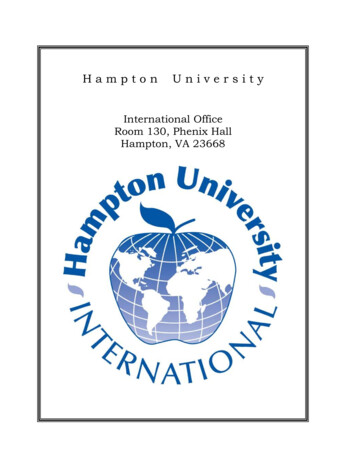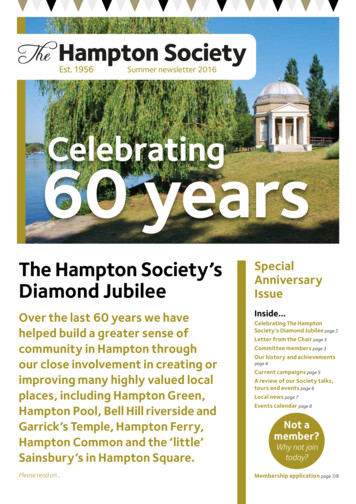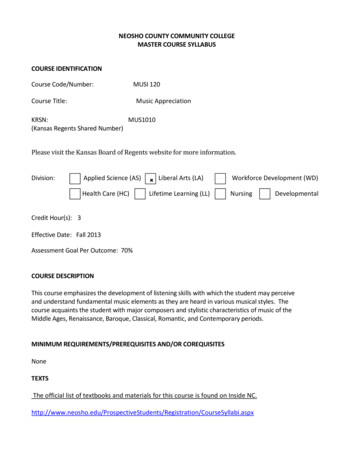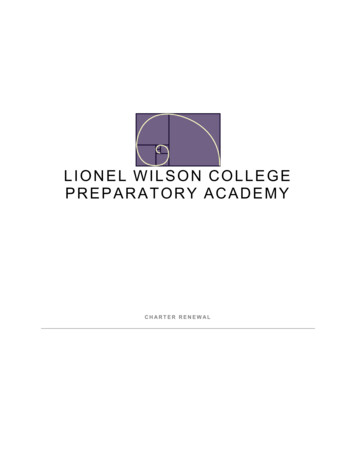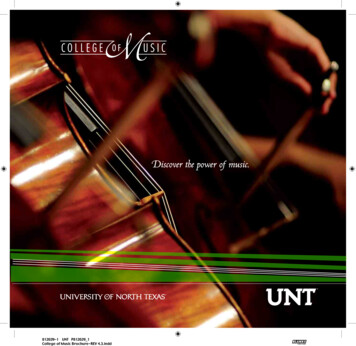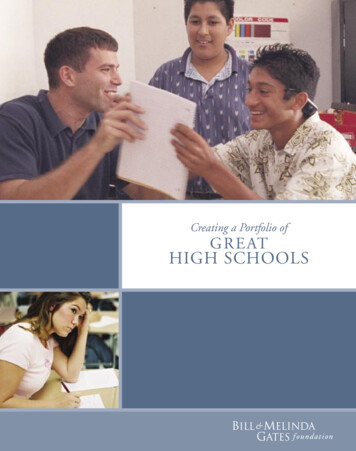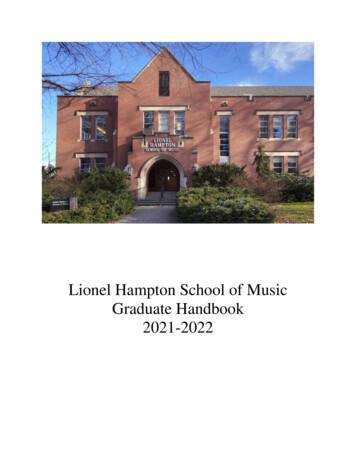
Transcription
Lionel Hampton School of MusicGraduate Handbook2021-2022
LHSOM Graduate HandbookINTRODUCTIONWelcome to the graduate program at the Lionel Hampton School ofMusic at the University of Idaho. Graduate students are a criticalcomponent of the LHSOM and help create the vibrant environment inour school. The LHSOM typically includes approximately 15 graduatestudents who serve a variety of roles as performers, scholars andteachers.Our Director of Graduate Studies is Dr. Javier Rodriguez, who teachesbassoon, aural skills, double reed techniques, and online introductionto music courses in the LHSOM. He is your primary resource for anyquestions you might have about your graduate program. Our officestaff may also be able to help you with any other issues you may haveincluding offices, keys, copying, et cetera. Our office staff includesDiane McGarry, Administrative Coordinator; Kelly O’Neill,Administrative Assistant; and Janice Todish, Financial Technician.If you are receiving a teaching assistantship, you must complete therequired training that the university provides prior to your firstsemester in residence.I look forward to getting to know you and seeing you progress throughyour unique journey. Please do not hesitate to reach out to me ifquestions should arise.Vanessa Sielert, D.M.A.Director and ProfessorLionel Hampton School of Music
PROGRAM OVERVIEWThe Lionel Hampton School of Music offers both thesis and non-thesisgraduate degree programs on campus and *fully online beginning in2021 for performance and composition. Performers generally complete anon-thesis program whereas music educators, composers, and specialistsin music history complete a thesis. Our goal is to produce graduates whowill be prepared for the next step in their careers as composers, scholars,educators or performers.PROGRAM COMPONENTS/DEGREE PLAN OPTIONS/DEGREEREQUIREMENTSThe LHSOM offers both the Master of Arts degree and the Master ofMusic degree.Master of Arts (M.A.) degree (on campus)The Master of Arts degree is designed to prepare the student to pursuethe Ph.D. The School of Music offers a concentration in music history.Prerequisite: A baccalaureate degree in music (or equivalent) from anaccredited institution is required. Students who lack this prerequisitemay correct deficiencies by passing appropriate courses that will not beapplicable toward the advanced degree.Master of Music (M.M.) degree (on campus or online)The Master of Music degree is designed to meet the needs ofprofessional performers, composers, and studio or school music teacherswho wish to pursue the curriculum as a terminal professional program orto use it as a foundation for doctoral study. Areas of concentration areavailable in Winds/Brass/Strings/Percussion/Voice Performance,Composition, Collaborative Piano, and Piano Pedagogy andPerformance Studies (Collaborate Piano and Piano Pedagogy andPerformance studies on campus only).
Prerequisite: A baccalaureate degree in music (or equivalent) from anaccredited institution is required. Students who lack this prerequisitemay correct deficiencies by passing appropriate courses that will not beapplicable toward the advanced degree.*New for 2021-2022: For Online Graduate Degrees: the distanceprogram will benefit the student who is bound to their current locationdue to financial or family obligations and is designed for the studentwho has previous professional experience. Along with the prescribedaudition requirements for each degree track, an interview will berequired with members of the LHSOM graduate committee.Prerequisites for Online Graduate Degrees:1. Requirements for technical competence: Technical competenciesfor these degrees will be the same as the in-person degrees. Allwill use the same applications and equipment.2. Technical equipment requirements: this list is published on ourwebsite under student resources as suggested for all ces/technical-equipment-recommendations.pdf, found undergeneral resources, technical equipment recommendations (PDF).Graduate Diagnostic Placement ExaminationThis examination is intended to aid the supervisory committee indetermining the student's background in music history and aural skills sothat the results may be used in making a study plan.Entering graduate students take one examination in music history andliterature and one exam in aural skills/ear training to showbaccalaureate-level competence. The exam is typically scheduled on theSaturday preceding the beginning of the Fall semester. It is the
responsibility of the student to arrive on campus in time to take theplacement exam.Students must demonstrate such competency in the subject area, eitherby passing the exam or being advised by their major professor to enrollin specified remedial courses before enrollment in any 500-level courseof that particular subject area. Students who do not take the exam (forany reason) may not enroll in any 500-level subject areas covered by theplacement examination until the exams have been completed.Study guides for the music history placement exam are available here:Graduate Diagnostic Placement Examination Study Guides(Download PDF)Students are encouraged to use www.musictheory.net orwww.teoria.com in order to prepare for the aural skills exam.If a student is directed to take classes to correct deficiencies identifiedby the diagnostic exam, those classes MUST be taken for a grade andthe student must receive a grade of C or better to remove the deficiency.Any deficiencies identified MUST be completed before a student cangraduate. Students may not present lecture recitals or theses until alldeficiencies are satisfied.General Requirements for All Graduate Degrees in Music Most master’s degrees require a minimum of 30 hours beyond thebachelor’s degree. The Music Education and Piano Pedagogydegrees require 32. For all degree plans, at least 18 credits must be earned in coursesnumbered 500 or higher. At least one-third of the minimum total credit hours must be in anarea of concentration, e.g., piano performance, music education,composition, etc.
Students are required to maintain a GPA of 3.0 or higher to satisfythe requirements for the graduate degree in music.An additional course in either music history (MusH) or musictheory (MusC) must be part of the student’s study plan.A maximum of 6 semester hours in directed study and 3 semesterhours in workshop or practicum are applicable toward the totalcredit hour requirement for the degree.No 400-level course may apply to a degree unless a degree planspecifically lists it in lieu of a 500-level course. In such cases, thespecific 400-level course must be included and approved by COGSin the Study Plan.”MusX 511 Bibliography and Research is a prerequisite to 500level history courses.MusC 521 Musical Analysis is a prerequisite to 500-level theorycourses.A full-time enrollment includes at least 9 credit hours. Themaximum is 16 credits excluding audited courses.All graduate students must meet the annual enrollment standard ofa minimum of 1 credit every 12 months.Active graduate students must enroll for at least one hour ofgraduate-level credit in any semester when university faculty orfacility resources are being utilized. This is also true for anysemester(s) in which the student is preparing a recital, conductingthesis research or taking the oral exam.All coursework applicable to a master’s degree must be completedwithin eight years immediately preceding the granting of thedegree.Recital InformationSee the LHSOM recital website
Dates and DeadlinesThe following dates and deadlines are particularly important: Before end of first semester: Complete "Appointment of Major Professor and CommitteeForm." Complete the Study Plan (Log into VandalWeb and open theDegree Audit program. Select the Planner tab. You will beentering information into the right-hand side, “StudentEducational Planner”.) Meet with major professor to develop an appropriateschedule for the completion of all recitals, documents and/orthesis, whichever is appropriate for the specific degree plan. Before end of penultimate semester: apply for graduation Beginning of recital semester: Schedule your recital. Refer tocurrent policy, complete the recital audition form by the appropriatedate, and put your recital on the calendar as soon as you are eligibleto do so. At least two weeks before recital: Complete your recital auditionwith all of your supervisory committee members in attendance. Four weeks in advance of thesis or document defense: copies ofpaper in final form due to all committee members Ten days in advance of thesis defense: Submit “Request of Proceedwith Final Defense of Thesis/Dissertation” form (not applicable fordocument defenses) Last day of dead week: Thesis is complete and final form due in theDean’s office of the College of Letters, Arts, and SocialSciences. Document in complete and final form due to the Directorof Graduate Studies. Last day of exam week: Thesis in complete and final form due in theCollege of Graduate Studies
Important: Please review COGS deadlines, found atwww.uidaho.edu/cogs/deadlines to ensure you are meeting properdeadlines for graduation in the term you have selected.Please note that it is ultimately your responsibility as a graduatestudent to be in communication with your professors, MajorProfessor (MP) graduate committee members, and the College ofGraduate Studies about your degree progression and timeline. Itis suggested that you ask to meet with your committee (onceformed) at least once a semester to check in with your progress.Helpful Resources LHSOM College of Letters, Arts & Social Sciences College of Graduate Studies UI Catalog Course Schedule National Association of Schools of Music (NASM)Note: all graduate students are encouraged to consult theUndergraduate Handbook for general LHSOM policies andprocedures that pertain to all students.SAMPLE STUDY PLANGraduate students are typically on campus for four semesters or studyonline beginning any non-summer semester (Fall/Spring). Here is asample study plan for the Master of Music in Performance:Fall Year 1:MusX 511 Bibliography and ResearchMusC 521 AnalysisMusA 534 Individual InstructionMusA 517 University Choir3 credits3 credits3 credits1 credit
Spring Year 1:MusA 534 Individual InstructionMusH 504 Special TopicsMusA 517 University ChoirMusA 591 RecitalMusH 551 Repertoire and Materials3 credits3 credits1 credit0 credits2 creditsFall Year 2:MusA 534 Individual InstructionMusH 510 Jazz HistoryMusA 565 Chamber EnsembleMusA 517 University ChoirMusA 515 Collaborative Piano3 credits3 credits1 credit1 credit1 creditSpring Year 2:MusA 534 Individual InstructionMusA 591 RecitalMusA 565 Chamber EnsembleMusH 519 Studies in 20th Century MusicMusA 523 Jazz EnsembleMusA 517 University ChoirMusA 592 Final Master’s Project3 credits0 credits1 credit3 credits1 credit1 credit0 credits
Recitals and chamber performances take place in the HaddockPerformance Hall.DEGREE PROGRAMS:Master of Arts: Music History(Thesis required: On Campus Only)ADMISSION REQUIREMENTSIn addition to the Graduate School requirements, the School of Musicrequires submission of examples of research and writing to demonstrateadequacy of background. Admission to this program is by permission ofthe Music History faculty.
COURSE REQUIREMENTS (30 credits)Required Core – 9 credits MusC 521 Musical Analysis (3 credits) Choose one of the following: MusH 504 Special Topics MusH 510 History of Jazz MusH 518 Classic and Romantic Music MusH 519 Twentieth Century Music MusH 520 World Music MusX 511 Bibliography and Research (3 credits)Required Major Courses – 12-15 credits Courses are selected from the MusH-500 series in consultationwith the major professor and supervisory committee (6-9 credits). Six credit hours of MusH courses are required if the optionalsupporting field is chosen, nine credit hours if not.MusH 500 Master’s Research and Thesis (6 credits): A reading competency in one foreign language is required andmust be demonstrated and assessed before enrolling in MusH 500Master's Research and Thesis.Optional Supporting Field (0-6 credits)The supporting field is to be in a field outside music. If this option ischosen, the subject matter must be appropriate and integral to the natureof the music history curriculum. Courses in this area will be selected inconsultation with the major professor and the supervisorycommittee. Courses classified/taken under this category must bedocumented in the study plan.Electives – 3-6 creditsElectives are selected by the student in consultation with the supervisorycommittee. Selection must include, with the required core courses, anadditional course in music theory (MusC).
Master of Music: Collaborative Piano(Non-thesis degree: On Campus Only)ADMISSION REQUIREMENTSIn addition to the College of Graduate Studies (COGS) requirements, theSchool of Music requires an acceptable audition either in person or byrecorded performance, and submission of repertoire lists (solo,accompaniments, chamber music) as evidence of previous study.Students are expected to have either completed diction courses inEnglish, Italian, French, and German at the undergraduate level, or todemonstrate proficiency in these languages and a functional knowledgeof IPA. Otherwise, students are considered deficient and are expected tocomplete the undergraduate equivalent. These credits are not applicableto the graduate degree.COURSE REQUIREMENTS (30 credits)Required Core – 9 credits MusC 521 Musical Analysis (3 credits) Choose one of the following: MusH 504 Special Topics MusH 510 History of Jazz MusH 518 Classic and Romantic Music MusH 519 Twentieth Century Music MusH 520 World Music MusX 511 Bibliography and Research (3 credits)Required Major Courses – 15 credits MusA 524 Individual Instruction: Accompanying (8 credits) MusA 555 Performance Practices (1 credit) MusA 515 Accompanying (1 credit each, taken 4 times) MusA 565 Chamber Ensemble (1 credit each, taken twice) MusA 591 Recital (0 credits, taken 4 times) MusA 592 Final Master’s Project (0 credits)
(Note: Each enrollment in MusA 591 shall consist of a public recital asapproved by the supervisory committee.Two of these recitals will involve vocal accompaniment and two willinvolve instrumental accompaniment. Among the four recitals, twoshould include chamber music.One lecture recital of 30 minutes will be presented in conjunctionwith one enrollment of MusA 592).Electives – 6 creditsElectives are selected by the student in consultation with the supervisorycommittee. Selection must include, in addition to the required corecourses, one course in either music history and literature (MusH) ormusic theory (MusC). Piano Repertoire and Piano Pedagogy/Materialsand Vocal Literature are recommended.Master of Music: Composition(Thesis required: On Campus and Online)ADMISSION REQUIREMENTSIn addition to the Graduate School requirements, the School of Musicrequires submission of three (3) recent original compositions. It issuggested that recordings to accompany the scores be submitted. Onlinedegree applicants require an interview by members of the LHSOMGraduate Committee.COURSE REQUIREMENTS (30 credits)Required Core – 9 credits MusC 521 Musical Analysis (3 credits) Choose one of the following: MusH 504 Special Topics MusH 510 History of Jazz
MusH 518 Classic and Romantic MusicMusH 519 Twentieth Century MusicMusH 520 World MusicMusX 511 Bibliography and Research (3 credits)Required Major Courses – 12 credits MusC 525 Composition (6 credits) MusC 500 Master’s Research and Thesis (6 credit) MusC 590 Recital (0 credit)(Note: The thesis shall consist of an original, large scalecomposition. The recital shall consist of a public recital of originalworks as approved by the supervisory committee.)Electives – 9 creditsElectives are selected by the student in consultation with the supervisorycommittee. Selection must include, in addition to the required corecourses, one course in either music history and literature (MusH) ormusic theory (MusC).Master of Music: Instrumental Performance(Non-thesis degree: On Campus and Online)ADMISSION REQUIREMENTSIn addition to the Graduate School requirements, the School of Musicrequires an acceptable audition either in person or by recordedperformance, and submission of repertoire lists as evidence of previousstudy. Online degree applicants require an interview by members of theLHSOM Graduate Committee.
COURSE REQUIREMENTS (30 credits)Required Core – 9 credits MusC 521 Musical Analysis (3 credits) Choose one of the following: MusH 504 Special Topics MusH 510 History of Jazz MusH 518 Classic and Romantic Music MusH 519 Twentieth Century Music MusH 520 World Music MusX 511 Bibliography and Research (3 credits)Required Major Courses – 14 credits MusA 534 Individual Instruction in major instrument (12 credits) MusA 5XX Ensemble (2 credits) MusA 591 Recital (0 credits, taken twice) MusA 592 Final Master’s Project (0 credits)(Note: Each enrollment in MusA 591 shall consist of a public recital asapproved by the supervisory committee. One of these enrollmentsshould be a recital composed primarily of significant chamber music. Adocument will be written and defended in conjunction with oneenrollment of MusA 591.)Electives – 7 creditsElectives are selected by the student in consultation with the supervisorycommittee. Selection must include, in addition to the required corecourses, one course in either music history and literature (MusH) ormusic theory (MusC).
Master of Music: Piano Pedagogy and Performance Studies(Non-thesis degree: On Campus Only)ADMISSION REQUIREMENTSIn addition to the Graduate School requirements, the School of Musicrequires an acceptable audition either in person or by recordedperformance, and submission of repertoire lists as evidence of previousstudy.COURSE REQUIREMENTS (32 credits)Required Core – 9 credits MusC 521 Musical Analysis (3 credits) Choose one of the following: MusH 504 Special Topics MusH 510 History of Jazz MusH 518 Classic and Romantic Music MusH 519 Twentieth Century Music MusH 520 World Music MusX 511 Bibliography and Research (3 credits)Required Major Courses (17 credits) MusA 524 Individual Instruction: Piano (8 credits) MusA 591 Recital (0 credits) MusA 555 Performance Practices (1 credit) MusT 536 Pedagogy & Materials: Keyboard I (2 credits) MusT 537 Pedgagoy & Materials: Keyboard II (2 credits) MusT 538 Practicum: Class Piano Teaching (2 credits) MusT 538 Practicum: Studio Teaching (2 credits) MusA 592 Final Master’s Project (0 credits)(Notes: The recital shall, as approved by the supervisory committee,consist of at least three pieces, of contrasting styleperiods. Additionally, a 40-minute lecture-demonstration, whichincludes a comprehensive oral exam, on a topic related to pianopedagogy is required during the second year of study.)
Two credits in any combination from: (2 credits) MusA 515 Accompanying MusA 565 Chamber EnsembleElectives (3-4 credits)Electives are selected by the student in consultation with the supervisorycommittee. Selection must include, in addition to the required corecourses, one course in either music history and literature (MusH) ormusic theory (MusC). Piano Repertoire is recommended and should betaken for one semester if it is not included in the undergraduatetranscript.Master of Music: Choral Conducting(Non-thesis degree: On Campus Only)ADMISSION REQUIREMENTSIn addition to the Graduate School requirements, the School of Musicrequires an acceptable audition either in person or by recordedperformance, and submission of repertoire lists (solo, accompaniments,chamber music) as evidence of previous study. Students are expected tohave either completed diction courses in English, Italian, French, andGerman at the undergraduate level, or to demonstrate proficiency inthese languages and a functional knowledge of IPA. Otherwise, studentsare considered deficient and are expected to complete the undergraduateequivalent. These credits are not applicable to the graduate degree.
COURSE REQUIREMENTS (31 credits)Required Core – 9 credits MusC 521 Musical Analysis (3 credits) Choose one of the following: MusH 504 Special Topics MusH 510 History of Jazz MusH 518 Classic and Romantic Music MusH 519 Twentieth Century Music MusH 520 World Music MusX 511 Bibliography and Research (3 credits)Required Major Courses – 22 credits MusA 587 Advanced Conducting (4 semesters x 2 credits 8credits) MusH 556/557 Choral Literature I and II (2 semesters x 2 credits 4 credits) MusA 516 Large Choral Ensemble (4 semesters x 1 credit 4credits) MusA 514 Voice (2 semesters X 1 credit 2 credits) MusT 535 Voice Pedagogy and Materials (2 credits) MusA 514 Piano (2 credits) MusA 591 Conducting Recital/ Project (0 credits) MusA 592 Final Master’s Project (0 credits)Master of Music: Piano Performance(Non-thesis degree: On Campus and Online)ADMISSION REQUIREMENTSIn addition to the Graduate School requirements, the School of Musicrequires an acceptable audition either in person or by recordedperformance, and submission of repertoire lists as evidence of previousstudy. Online degree applicants require an interview by members of theLHSOM Graduate Committee.
COURSE REQUIREMENTS (30 credits)Required Core – 9 credits MusC 521 Musical Analysis (3 credits) Choose one of the following: MusH 504 Special Topics MusH 510 History of Jazz MusH 518 Classic and Romantic Music MusH 519 Twentieth Century Music MusH 520 World Music MusX 511 Bibliography and Research (3 credits)Required Major Courses – 15 credits MusA 534 Individual Instruction: Piano (12 credits) MusA 555 Performance Practices (1 credit) Two credits in any combination from: MusA 515 Accompanying MusA 565 Chamber Ensemble MusA 591 Recital (0 credits, taken twice) MusA 592 Final Master’s Project (0 credits)(Note: Each enrollment in MusA 591 shall consist of a public recital asapproved by the supervisory committee. One of these enrollmentsshould be a recital composed primarily of significant chamber music. Adocument will be written and defended in conjunction with oneenrollment of MusA 591.)Electives – 6 creditsElectives are selected by the student in consultation with the supervisorycommittee. Selection must include, in addition to the required corecourses, one course in either music history and literature (MusH) ormusic theory (MusC). Piano Repertoire and Piano Pedagogy/Materialsare recommended. If Piano Repertoire is not part of the undergraduatetranscript, it should be taken for two semesters. If PianoPedagogy/Materials is not part of the undergraduate transcript, it shouldbe taken for at least one semester.
Master of Music: Voice Performance(Non-thesis degree: On Campus and Online)ADMISSION REQUIREMENTSIn addition to the Graduate School requirements, the School of Musicrequires an acceptable audition either in person or by recordedperformance, and submission of repertoire lists as evidence of previousstudy. The audition must demonstrate competence in the English,French, German, and Italian song literature. Selections should be ofcontrasting vocal line, dynamics, and language. The candidate shouldprovide evidence of having performed an undergraduate public recital.The candidate should have satisfied the undergraduate requirement invoice repertoire, diction, vocal pedagogy, and foreign language, and isexpected to be proficient in English, German, French, and Italiandiction. Otherwise, students are considered deficient and are expected tocomplete the undergraduate equivalent. These credits are not applicableto the graduate degree. Online degree applicants require an interview bymembers of the LHSOM Graduate Committee.COURSE REQUIREMENTS (30 credits)Required Core – 9 credits MusC 521 Musical Analysis (3 credits) Choose one of the following: MusH 504 Special Topics MusH 510 History of Jazz MusH 518 Classic and Romantic Music MusH 519 Twentieth Century Music MusH 520 World Music MusX 511 Bibliography and Research (3 credits)
Required Major Courses – 14 credits MusA 534 Individual Instruction: Voice (12 credits) MusA 580 Opera Workshop (2 credits) MusA 591 Recital (0 credits, taken twice) MusA 592 Final Master’s Project (0 credits)(Note: Each enrollment in MusA 591 shall consist of a public recital asapproved by the supervisory committee. One of these enrollmentsshould be a recital composed primarily of chamber music or a major rolein a major work. A document will be written and defended inconjunction with one enrollment of MusA 591.)Electives – 7 creditsElectives are selected by the student in consultation with the supervisorycommittee. Selection must include, in addition to the required corecourses, one course in either music history and literature.Distinguished Professor Dan Bukvich conducts a Holiday Concertperformance.
SELECTION OF THE MAJOR PROFESSORThe major professor is appointed by the LHSOM Director of GraduateStudies during a student’s first semester in residence. In the case ofperformance candidates, the major professor is usually a student’s studioteacher. In the case of music history candidates, the major professor willbe a member of the music history faculty. In the case of music educationcandidates, the major professor will be a member of the music educationfaculty. In the case of composition candidates, the major professor willbe a member of the composition faculty. Any major professor must be amember of the university’s graduate faculty. If the major professor needsto be changed for any reason, a student may select a new majorprofessor in conjunction with the Director of Graduate Studies. In thiscase, a student must complete the COGS change of major professorform.It is the responsibility of the major professor to develop a study plan inconsultation with each of their advisees. For non-thesis degreecandidates, the major professor will also advise the student on selectionof repertoire for their recitals as well as the topic for either a graduatedocument or lecture recital.THE SUPERVISORY COMMITTEEThe Supervisory Committee is responsible for the guidance anddirection of the student's graduate program. Each graduate student willhave a major professor assigned by the Director of Graduate Studies.Together, the major professor and the graduate student will nominate asupervisory committee to be chaired by the major professor. Thesupervisory committee, of which at least half are members of thegraduate faculty, is constructed as outlined below.
Performance majors – major professor (chair) and additional facultymembers from education or similar performance interests, and/or amember of the academic music faculty (music education, music historyand/or music theory)Piano Pedagogy and Performance Studies – major professor (chair),additional faculty member from education or similar performanceinterests, and/or a member of the academic music faculty (musiceducation, music history and music theory)Accompanying majors – major professor (chair), additional facultymember from the keyboard area, and/or a member of the academicmusic faculty (music education, music history and music theory)Composition – major professor (chair), additional faculty member fromtheory/composition area, and an additional active University of Idahofaculty member from outside the School of Music facultyHistory majors – major professor (chair), additional faculty memberfrom history, and an additional active University of Idaho facultymember from outside the School of Music faculty
THESES/DOCUMENTS/ORAL EXAMINATIONSA thesis is an extended written document in which the author thoroughlyexamines a subject and provides and offers a perspective or position thatcontributes to knowledge.Both theses and documents, in final draft form, must be delivered inindividual copies (digital) to all committee members at least four weeksprior to the oral exam. Once the oral exam is passed, theses aresubmitted to the College of Letters, Arts, and Social Science forapproval one week before the published deadline for submission to theCOGS. Documents, once approved by the committee, are submitted tothe Music Office.All students are strongly urged to consult with their major professorsabout the timeline recommended to ensure timely completion of thedocument or thesis.For theses and documents, the School of Music uses the most recentedition of "A Manual for Writers of Research Papers, Theses, andDissertations" by Kate L. Turabian (University of Chicago Press) as thestandard reference work for issues of form and procedure for theses anddocuments in most areas of music.Music HistoryThe Music History degree plan requires a thesis. A thesis is an extendedproject (recommended minimum 80 pages in length) in which the writerexplores a unique subject resulting in new contributions to knowledge ina specific area. Theses must conform in all details of format with theguidelines in the “Graduate Handbook for Theses and Dissertations”published by the College of Graduate Studies.
CompositionThe Composition degree plan requires a thesis. In this case, a largescale original work satisfies the thesis requirement.Performance/Accompanying/Piano Pedagogy and PerformanceStudiesNote: These are considered “non-thesis” degrees for all students,regardless of the two options below.Students have two options:A. Document Option:A document is a written project, in the range of 25-30 pages long,which directly supports the final degree project, whether recital orcomposition. The document should be of a depth that would beappropriate for publication in a professional journal.B. Lecture-Recital Option1) The lecture is to be presented by November 1 for fall graduationor April 1 for spring graduation. It is the major
The Lionel Hampton School of Music offers both thesis and non-thesis graduate degree programs on campus and *fully online beginning in 2021 for performance and composition. Performers generally complete a non-thesis program whereas music educators, composers, and specialists in music history complete a thesis. Our goal is to produce graduates who

